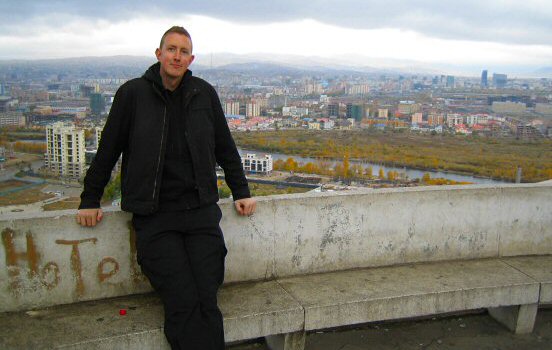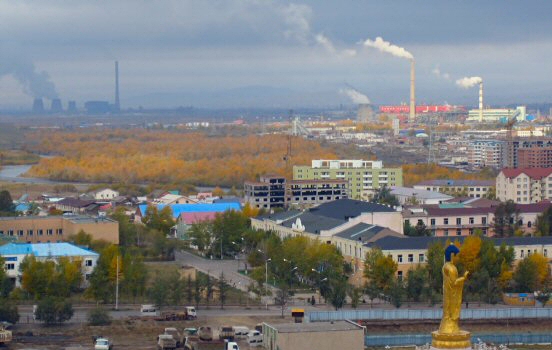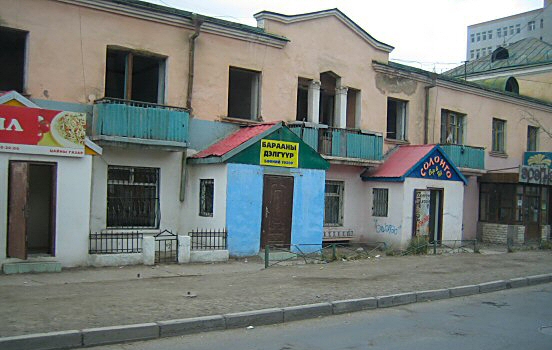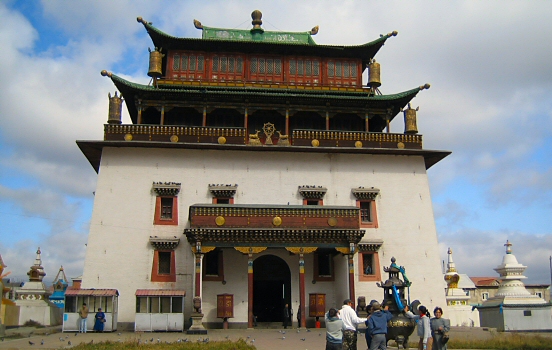One minute I’m dozing on a Soviet-era train, the next I’m dropped into the Mongolian capital like a sack of flour from a low-flying plane. I place my dusty shoes on the pavement of the Ulaanbataar railway station and quickly scan the area. Tired and hungry, I’m probably an easy target for any shadowy existence lurking here. Luckily it is Sunday morning and the locals seem to sleep a lot.
Ah yes, did I mention the locals? Before I even got off the train I saw someone taking a dump next to the railway track. Welcome to Mongolia.
 Chilling in the cold at Zaisan hill in Ulaanbataar.
Chilling in the cold at Zaisan hill in Ulaanbataar.
Ulaanbataar was originally founded back in 1639, but redesigned by the Soviets in the 1940s and clearly not made for this amount of personal vehicles. The traffic was crazy and within ten minutes I saw my first collision. I read that only half of the vehicles in Mongolia are left-handed, even though the traffic drives on the right side. This seems to be linked to a preference for Japanese imports. As you might expect, there is a lot of honking going on here.
 Postcard view from Zaisan hill. Wish you were here.
Postcard view from Zaisan hill. Wish you were here.
I grab a coffee that tastes like diesel and burnt dreams. But it’s hot, and it does the job. The city starts to stir, slowly and reluctantly.
After crossing the Tuul river, I reach a nearby hilltop to get a look at the polluted city where ugly power stations and shining Buddha statues are uneasy neighbors.
With a large coal power plant visible outside the city, the smog is quite heavy and I read that during winter the sight range can be down to ten meters. This is the second most polluted city in the world, since New Delhi wins the first place. I love the smell of pollution in the morning, to paraphrase Lieutenant Kilgore in Apocalypse Now.
 Exciting street in Ulaanbaatar.
Exciting street in Ulaanbaatar.
The sun is crawling up behind the distant hills like it’s not entirely sure it wants to be here either. The cold bites my face like a hungry Velociraptor, but I didn’t come here for luxury. I came for moments like this, standing at the edge of something ancient and alive, watching the smoke rise from ger tents in the hills, wondering what the hell I’m doing so far from home.
 Gandantegchinlen Monastery, Ulaanbaatar.
Gandantegchinlen Monastery, Ulaanbaatar.
Back in town, I encounter a shadow from the past. A statue of Lenin looks down on me, face filled with disapproval. I skip past the bald guy and enter the impressive Gandantegchinlen (say what?) monastery, where I gaze upon the 26 meter tall statue inside a large building. This temple was built in 1911 and devoted to Janraiseg, the Boddhisattva of Compassion. That didn’t stop the Russians from destroying the statue, but it was rebuilt in 1996 and the building is today a symbol of independence for the Mongolians.
Ulaanbataar turned out to be just like I imagined. Tradition and chaos, elbow to elbow, with no apologies.

8 comments
Leave a reply